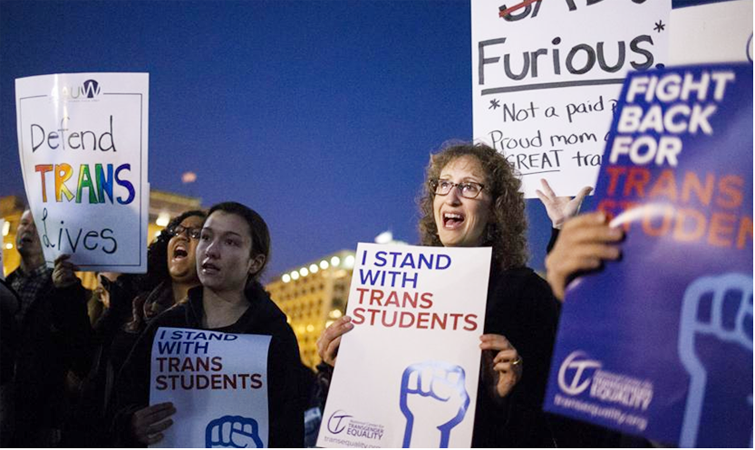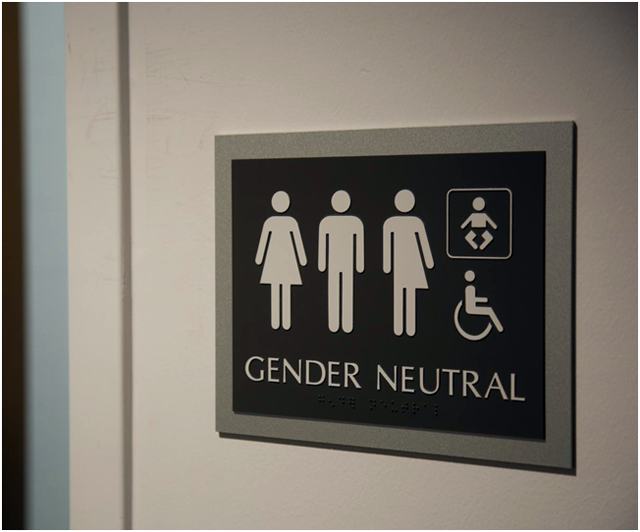
Title IX of the Education Amendments Act establishes that “No person in the United States shall, on the basis of sex, be excluded from participation in, be denied the benefits of, or be subjected to discrimination under any education program or activity receiving Federal financial assistance.” On May 2016, the Obama administration released a guideline suggesting that this federal law applied not only to discriminations based on sexual identity but also gender identity. In other words, students could not be discriminated by federally funded educational programs or institutions based on what gender they identified as. This guideline had extraordinary significance in the acknowledgement of social rights, especially those of transgender students who could now be protected whilst using bathrooms based on whatever gender they identified by.
However, recently on February 22, 2017, the Trump administration rescinded these guidelines. As a result, the administration has undermined the rights of transgender students all over the country. Now, transgender students in public schools are not able to receive the protection that the Obama administration’s guidelines had once allotted them. This decision may significantly impact pending court cases regarding transgender rights.
For instance, Gavin Grimm, a transgender teenager from Virginia, sued his school board for prohibiting him from using the boys’ restroom. The administration’s actions may undercut his argument and ultimately hamper progress of the attainment of transgender rights.
However, recently on February 22, 2017, the Trump administration rescinded these guidelines. As a result, the administration has undermined the rights of transgender students all over the country. Now, transgender students in public schools are not able to receive the protection that the Obama administration’s guidelines had once allotted them. This decision may significantly impact pending court cases regarding transgender rights.
For instance, Gavin Grimm, a transgender teenager from Virginia, sued his school board for prohibiting him from using the boys’ restroom. The administration’s actions may undercut his argument and ultimately hamper progress of the attainment of transgender rights.

Although the decision relates solely to public school policies, it has been a topic of conversation at Phillips Academy, a private boarding school in Massachusetts. Inclusivity remains as one of Phillips Academy’s main virtues. Consequently, the school has accommodated for those of varying genders through gender-neutral bathrooms as well as a new all-gender housing program. Students have begun discussing the implications of the administration’s repeal of the Obama-era guidelines.
I interviewed Karissa Kang ’17, a senior, who is the co-president of Andover’s Gay Straight Alliance (GSA):
Question 1: How do you think that this decision impacts everybody? As a student attending a private school, why do you think that this event is important for everybody to consider?
Private school students shouldn’t consider themselves unaffected by the Trump administration’s decision. We are privileged enough to have myriad restrooms that accommodate students of various genders, and our administration continues to work with trans students to best accommodate them. However, the fact remains that our peers at public schools will be forced to live the realities of this decision. It is our job, too, to think critically about how we can combat such direct discrimination from the government. After all, we must remember that, regardless of what school we attend, trans students across the nation live under the jurisdiction of a president who has explicitly condemned the essence of our gender identities.
Question 2: How serious do you think are the effects that this decision could have on students? What about for Andover students?
To be denied something as basic as the right to use the restroom that aligns with one’s gender identity can be crushing. To, say, a trans boy, using the girls’ restroom might cause intense dysphoria that could discourage him for using the restroom at all during the school day. Single-stall restroom stalls, while, perhaps more comfortable, aren’t necessarily better in that they, too, dismiss his gender identity. In other words, both of these options are reminders that he is not allowed to be a boy, though he knows he is.
Question 1: How do you think that this decision impacts everybody? As a student attending a private school, why do you think that this event is important for everybody to consider?
Private school students shouldn’t consider themselves unaffected by the Trump administration’s decision. We are privileged enough to have myriad restrooms that accommodate students of various genders, and our administration continues to work with trans students to best accommodate them. However, the fact remains that our peers at public schools will be forced to live the realities of this decision. It is our job, too, to think critically about how we can combat such direct discrimination from the government. After all, we must remember that, regardless of what school we attend, trans students across the nation live under the jurisdiction of a president who has explicitly condemned the essence of our gender identities.
Question 2: How serious do you think are the effects that this decision could have on students? What about for Andover students?
To be denied something as basic as the right to use the restroom that aligns with one’s gender identity can be crushing. To, say, a trans boy, using the girls’ restroom might cause intense dysphoria that could discourage him for using the restroom at all during the school day. Single-stall restroom stalls, while, perhaps more comfortable, aren’t necessarily better in that they, too, dismiss his gender identity. In other words, both of these options are reminders that he is not allowed to be a boy, though he knows he is.

In her interview, Karissa argued that being denied the very rights associated with one’s gender can be crushing. On the other side of the debate, however, opponents of gender inclusive bathrooms primarily cite the possibilities of sexual assault.
For instance, Phil Berger, a Republican member of the North Carolina General Assembly, wrote in a letter to business executives that “Ill-intentioned, non-transgender individuals, some with criminal pasts, have used similar ordinances elsewhere in the country to gain legal access to changing facilities and bathrooms of minors of the opposite sex.” The issue is complex. The challenge will be to figure out a way to accommodate for trans people while also taking into account concerns from other members of society.
For instance, Phil Berger, a Republican member of the North Carolina General Assembly, wrote in a letter to business executives that “Ill-intentioned, non-transgender individuals, some with criminal pasts, have used similar ordinances elsewhere in the country to gain legal access to changing facilities and bathrooms of minors of the opposite sex.” The issue is complex. The challenge will be to figure out a way to accommodate for trans people while also taking into account concerns from other members of society.
Thus far, no definitive solutions have been reached on this debate. However, there are a few circulating alternatives. Karissa mentioned one: unisex, single-stall bathrooms. However, she also mentioned how these single-stall bathrooms lead to the dismissal of gender identities. Another solution is to expand bathroom categories to involve trans-boy and trans-girl bathrooms. However, there may be problems in terms of allocating enough resources and space for the purpose of creating two new bathroom facilities in all public institutions.
Questions still remain in terms of how our society should handle transvestites. However, one thing is clear. This issue will have colossal implications regarding the values and ideals of our society. Everyone should learn more about it and take a stance.
Questions still remain in terms of how our society should handle transvestites. However, one thing is clear. This issue will have colossal implications regarding the values and ideals of our society. Everyone should learn more about it and take a stance.

Sparky Yoo
Junior
Phillips Academy (Andover)
By Sparky Yoo

